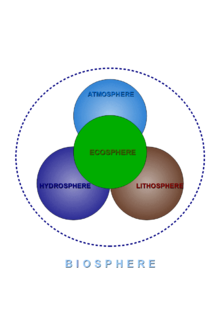- Earth system science
-
 La biosphère comme un système unique des autres systèmes. L'écosphère, ou système du Vivant, est au centre.
La biosphère comme un système unique des autres systèmes. L'écosphère, ou système du Vivant, est au centre.
L'Earth system science est une discipline scientifique intègrant diverses études académiques dans le but de comprendre la Terre, considérée comme un système et constituée de l'atmosphère, de l'hydrosphère, de la lithosphère et de la biosphère[1]. Le nom de géophysiologie, proposée par James Lovelock, y est synonyme.
En 1996, l'American Geophysical Union, en coopération avec le Keck Geology Consortium et avec l'aide de cinq laboratoires de la National Science Foundation, organise un atelier pour « définir les objectifs communs entre chaque discipline des sciences de la Terre ». La Terre y est vue comme un ensemble de systèmes en interactions. Il a été décidé également de constituer une filière d'étude, en relation avec la National Science Foundation[2].
Le Science Education Resource Center (SERC), installé au Carleton College en propose la définition suivante[3] :
« Earth system science embraces chemistry, physics, biology, mathematics and applied sciences in transcending disciplinary boundaries to treat the Earth as an integrated system and seeks a deeper understanding of the physical, chemical, biological and human interactions that determine the past, current and future states of the Earth. Earth system science provides a physical basis for understanding the world in which we live and upon which humankind seeks to achieve sustainability. »
Les études relatives à la discipline de la Earth system science sont publiées au sein du Journal of Earth System Science, anciennement titré Proceedings of the Indian Academy of Sciences[4].
L'ouvrage de Lee Kump, James Kasting et Robert Crane, The Earth System, fournit l'état des connaissances actuelles sur les liens complexes qui unissent les algues, la production de soufre gazeux, la chimie atmosphérique, la physique des nuages et le climat.
Sommaire
Notes et références
- Earth System Science, Classroom of the future.
- Shaping the Future of Undergraduate Earth Science Education, American Geophysical Union.
- Earth System Science in a Nutshell, Carleton College.
- Journal of Earth System Science, Springer (co-publisher).
Annexes
- (en) Cet article est partiellement ou en totalité issu de l’article de Wikipédia en anglais intitulé « Earth system science » (voir la liste des auteurs)
Articles connexes
Liens externes
- (en) Site du Earth system science Partneship
- (en) Présentation
- (en) Site du Journal of Earth System Science
Bibliographie
- (en) Lee Kump, J. F. Kasting, et R. G. Crane, The Earth System, New Jersey, Pearson Publishing, 2008 (non traduit en français)
- (en) William Irwin Thompson, Gaia 2: emergence : the new science of becoming, SteinerBooks, 1991 (ISBN 9780940262409) [lire en ligne]
- Jim Gillon, « Earth systems: Feedback on Gaia », dans Nature, no 406, 17 août 2000, p. 685-686 [résumé]
- Lee R. Kump, « The physiology of the planet », dans Nature, no 381, 9 mai 1996, p. 111-112
Wikimedia Foundation. 2010.
